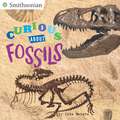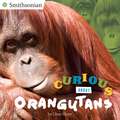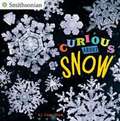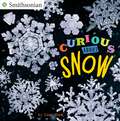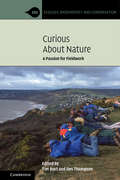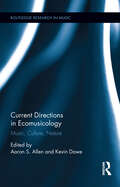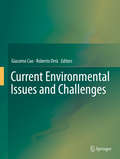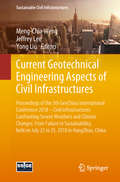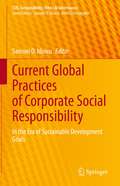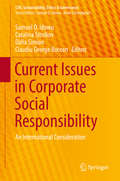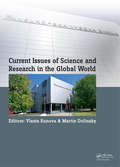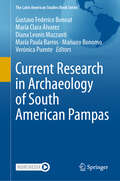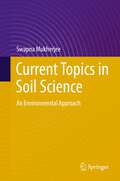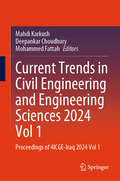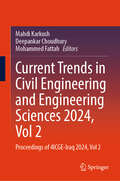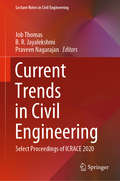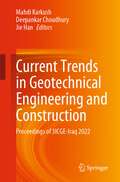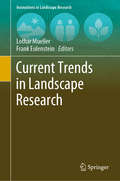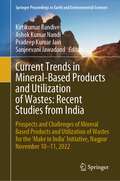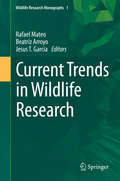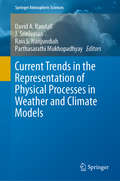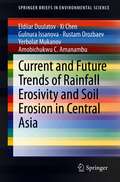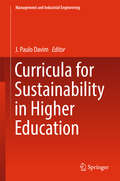- Table View
- List View
Curious About Fossils (Smithsonian)
by Kate WatersDig into this photo-packed Penguin-Smithsonian book about fossils—and find out what was going on in our world.Aren't you curious about what Earth was like long ago? What creatures lived before us? What happened to the dinosaurs?Curious about Fossils explains why and where fossils form and looks at the colorful lives and important discoveries of some of the great early fossil hunters and collectors, including Mary Anning who unearthed the first ichthyosaur skeleton; Richard Owen who coined the word dinosaur; and Barnum Brown, who discovered the first remains of a T-rex. Then the adventure continues into modern times, where scientists on fossil hunts in places like North Dakota's Hell Creek Formation use computers and other technology to dig up the fossilized bones, teeth, and even poop that provide clues to the past. A must read for every kid who's ever collected a shark tooth or trilobite!
Curious About Orangutans (Smithsonian)
by Gina ShawPrimate Power! What's got long red hair, toes that work like thumbs, arms longer than its legs, swings from tree branch to tree branch, and can even use an iPad? The amazing orangutan! Smithsonian's National Zoo is actively working to help save this endangered primate. Curious about how? Check out this 8 x 8 filled with full-color photos and lively text about how orangutans live and how the Zoo provides for their enrichment and survival.
Curious About Snow
by Gina ShawSnowflakes are falling--and this cool new 8 x 8 in the Smithsonian nonfiction line tells young readers why! <p><p> When does it snow? Why is snow white? How do we know no two snowflakes are alike? (Hint: the proof is in the photographs, first made in the 1890s!) With full-color photographs and the Smithsonian's famous Wilson Bentley snowflake photos, this new Curious About title looks at the science behind snow, and the history of record-setting blizzards and snowstorms--plus how people have fun in the snow!
Curious About Snow (Smithsonian)
by Gina ShawSnowflakes are falling—and this cool new 8 x 8 in the Smithsonian nonfiction line tells young readers why!When does it snow? Why is snow white? How do we know no two snowflakes are alike? (Hint: the proof is in the photographs, first made in the 1890s!) With full-color photographs and the Smithsonian&’s famous Wilson Bentley snowflake photos, this new Curious About title looks at the science behind snow, and the history of record-setting blizzards and snowstorms—plus how people have fun in the snow!
Curious about Nature: A Passion for Fieldwork (Ecology, Biodiversity and Conservation)
by Des Thompson Tim BurtNotwithstanding the importance of modern technology, fieldwork remains vital, not least through helping to inspire and educate the next generation. Fieldwork has the ingredients of intellectual curiosity, passion, rigour and engagement with the outdoor world - to name just a few. You may be simply noting what you see around you, making detailed records, or carrying out an experiment; all of this and much more amounts to fieldwork. Being curious, you think about the world around you, and through patient observation develop and test ideas. Forty contributors capture the excitement and importance of fieldwork through a wide variety of examples, from urban graffiti to the Great Barrier Reef. Outdoor learning is for life: people have the greatest respect and care for their world when they have first-hand experience of it.
Curious by Nature: One Woman's Exploration of the Natural World
by Candace SavageThe author of Strangers in the House examines nature&’s connection to herself and humanity in this collection of essays.Curious by Nature showcases Candace Savage&’s exploration of the varied ways we relate to wildlife from our retelling of fairytales about the big, bad wolf to our struggles to find a balance between harvesting trees and allowing grizzly bears the space to roam. Along the way, she asks intriguing questions to which she sets out to find answers, such as what brings out the mothering instinct in mammals, what are the forces behind the spectacular displays of the northern lights, and just how do crows calculate the optimum height from which to drop their whelks? Savage has spent the last twenty-five years exploring our complex relationships with the natural world: our prejudices, our growing body of scientific knowledge, our awe. She is particularly interested in bridging the gap between mythology and science, between longing and fact. Creating a livable future for ourselves and for other species, she believes, calls for both knowledge and love, and a deep sense of the value of wildness. This book is a record of Savage&’s ongoing quest to engage readers in a conversation that enriches our lives and the lives of the animals whose stories she tells.Praise for Curious by Nature &“Whimsical . . . . Though Savage is distressed by this &“destruction that we, as high-end consumers of the world's splendor, are leaving in our wake,&” the purpose of her essays is not to incite indignation but "to bring the ungraspable reality of the non-human world into clearer focus.&” In this she succeeds admirably.&” —Publishers Weekly
Current Account and External Sustainability in the Baltics, Russia, and Other Countries of the Former Soviet Union
by Donal McgettiganCurrent account developments in the Baltics, Russia, and other countries of the former Soviet Union (FSU).
Current Directions in Ecomusicology: Music, Culture, Nature (Routledge Research in Music)
by Aaron S. Allen Kevin DaweThis volume is the first sustained examination of the complex perspectives that comprise ecomusicology—the study of the intersections of music/sound, culture/society, and nature/environment. Twenty-two authors provide a range of theoretical, methodological, and empirical chapters representing disciplines such as anthropology, biology, ecology, environmental studies, ethnomusicology, history, literature, musicology, performance studies, and psychology. They bring their specialized training to bear on interdisciplinary topics, both individually and in collaboration. Emerging from the whole is a view of ecomusicology as a field, a place where many disciplines come together. The topics addressed in this volume—contemporary composers and traditional musics, acoustic ecology and politicized soundscapes, material sustainability and environmental crisis, familiar and unfamiliar sounds, local places and global warming, birds and mice, hearing and listening, biomusic and soundscape ecology, and more—engage with conversations in the various realms of music study as well as in environmental studies and cultural studies. As with any healthy ecosystem, the field of ecomusicology is dynamic, but this edited collection provides a snapshot of it in a formative period. Each chapter is short, designed to be accessible to the nonspecialist, and includes extensive bibliographies; some chapters also provide further materials on a companion website: http://www.ecomusicology.info/. An introduction and interspersed editorial summaries help guide readers through four current directions—ecological, fieldwork, critical, and textual—in the field of ecomusicology.
Current Environmental Issues and Challenges
by Giacomo Cao Roberto OrrùFew books currently exist that cover such a wide spectrum of topics. The chapters dealing with air pollution from mobile sources, air pollution and health effects and air quality modelling fall into the air pollution category while the ones related to microalgae for carbon dioxide sequestration/biofuels production, fuel cells, and solar energy technology, respectively, can be ascribed to the energy topic. Several technologies to handle a wide spectrum of environmental pollutants are taken into account in numerous chapters. The chapter on biodiversity is clearly related to the conservation issue, while the water pollution subject is tackled by the chapter on water quality monitoring. Finally, a general analysis on green business, as well as a chapter on grid/cloud computing technology for collaborative problem solving and shared resources management conclude the work. Because of its breadth of coverage, this book is particularly useful as a graduate text.
Current Geotechnical Engineering Aspects of Civil Infrastructures: Proceedings of the 5th GeoChina International Conference 2018 – Civil Infrastructures Confronting Severe Weathers and Climate Changes: From Failure to Sustainability, held on July 23 to 25, 2018 in HangZhou, China (Sustainable Civil Infrastructures)
by Jeffrey Lee Yong Liu Meng-Chia WengThis book deals with the attempts made by the scholars and engineers to address contemporary issues in geotechnical engineering such as characterization of geomaterials, slope stability and tunneling, sustainability in geohazards and some other geotechnical issues that are becoming quite relevant in today's world. With increasing urbanization rates and development of society, advancement in geotechnical technologies is essential to the construction of infrastructures. Geotechnical Investigation is the first step of applying scientific methods and engineering principles to obtain solutions of civil engineering problems. Papers were selected from the 5th GeoChina International Conference on Civil Infrastructures Confronting Severe Weathers and Climate Changes: From Failure to Sustainability, held on July 23-25, 2018 in HangZhou, China.
Current Global Practices of Corporate Social Responsibility: In the Era of Sustainable Development Goals (CSR, Sustainability, Ethics & Governance)
by Samuel O. IdowuThis book addresses the status quo of Corporate Social Responsibility practices and their development since 2008. How have things changed in the practice of CSR? What new opportunities and challenges have arisen? The book reports on an international set of cases and case studies on how CSR is practiced at business and organizations in various countries. It analyzes country-specific and industry-specific issues, as well as general global issues in connection with the United Nations’ Sustainable Development Goals. The contributions gathered here provide comprehensive information on CSR for both practitioners and researchers around the globe.
Current Issues in Corporate Social Responsibility: An International Consideration (CSR, Sustainability, Ethics & Governance)
by Samuel O. Idowu Catalina Sitnikov Dalia Simion Claudiu George BoceanThis book takes a fresh look at current issues in corporate social responsibility (CSR) with a special focus on emerging economies. In particular, it includes dedicated chapters on the theory of CSR, related principles and values, and insights from cross-generational investigations. In turn, the second part of the book examines the relation between financial performance and social responsibility in different industries and types of organizations. The third part presents cases involving emerging economies, and addresses reporting, auditing and accounting, as well as sector-specific issues for e. g. retailing and banking. Lastly, the book tackles the aspects of financial performance and taxation in a number of case studies and practical examples. Overall the book provides cutting-edge insights into the theory and practice of CSR from European countries that can be considered emerging or developing.
Current Issues of Science and Research in the Global World: Proceedings of the International Conference on Current Issues of Science and Research in the Global World, Vienna, Austria; 27-28 May 2014
by Vlasta Kunova Martin DolinskyThis book contains the papers presented at the International Conference on Current Issues of Science and Research in the Global World, held at the premises of the Vienna University of Technology from May 27 to May 28, 2014. The book represents a significant contribution to Law, Economics, Information & Communication Technologies, Journalism and
Current Research in Archaeology of South American Pampas (The Latin American Studies Book Series)
by Mariano Bonomo Gustavo Federico Bonnat María Clara Álvarez Diana Leonis Mazzanti María Paula Barros Verónica PuenteThis volume includes a selection of papers derived from the IX Conference of the Pampas region of Argentina, held virtually in 2021 in Mar del Plata (Buenos Aires, Argentina) and organized by the National University of Mar del Plata. Located in the southern cone of South America, the Pampas are vast plain grasslands that range across central Argentina and are one of the largest prairies of the world. The early traces of humans date back to ca. 12,200 14C years BP. From the Late Pleistocene up to the Spanish Conquest in the sixteenth century, hunter-gatherer groups occupied the Pampas. Archaeological research in the region has been focused on fascinating topics such as the early peopling, the mobility circuits in the past, the interaction between indigenous and colonial societies, and the perception of this complex past by the modern Pampean society, mainly integrated by European immigrants and indigenous descendants. This book gathers these themes and includes a selection of a conference of one of the keynote speakers and 18 papers that represent diverse topics on the current Pampean research. The book is structured in two main axes: 1) prehispanic studies using different lines of evidence; 2) historical archaeology and cultural heritage.
Current Topics in Soil Science: An Environmental Approach
by Swapna MukherjeeSoil is an important but often neglected element of the climate system. It is the second largest carbon store, or ‘sink’, after the oceans. Despite being a fundamental resource that supports all kinds of life on Earth, concerns related to soil are often not included as an important environmental issue. Climate changes put soil under pressure. The increasing concentration of carbon dioxide in our atmosphere may cause the microbes in the soil to work faster to break down organic matter, potentially releasing even more carbon dioxide. The soil moisture content is being constantly affected by rising temperatures and changes in precipitation patterns and future projections show that this may continue. This book presents current environmental issues and their remedies for soil which are mainly based on soil degradation, soil pollution and the effect of climate change on the soil. Adding xenobiotic chemicals or other alterations in the natural soil environment for agricultural, industrial or urban purposes result in a decline in the soil quality due to improper use or poor management, which is a serious environmental problem. The book is divided into five parts - soil science, soil physics, soil chemistry, soil biology and soil environment. The first part “Soil Science” serves as the introduction to the book and discusses some common topics such as soil formation, mineralogy, taxonomy, quality and analytical techniques. The second part “Soil Physics” is mainly concerned with the physical properties and processes of soil and their association with effects on air, water and temperature. Soil Chemistry, the third part, discusses the chemical reactions and processes between inorganic and organic components. The fourth part “Soil Biology” explains the biological properties and processes of the soil, with special concern to microbial diversity and its effect on the ecology. Lastly, the fifth part “Soil Environment” discusses the current environmental problems such as climate change and soil pollution, including processes to mitigate these issues through carbon sequestration, nutrient management and land management.
Current Trends in Civil Engineering and Engineering Sciences 2024, Vol 1: Proceedings of 4ICGE-Iraq 2024, Vol 1
by Deepankar Choudhury Mahdi Karkush Mohammed FattahThis book contains selected articles from the fourth International Conference on Geotechnical Engineering-Iraq 2024 (ICGE-2024) held on April 17–18, 2024, at at Warith Al-Anbiyaa University, Karbala, Iraq. This proceeding discusses the latest research and studies in geotechnical engineering and all related topics in different fields such as civil engineering, environmental engineering, and architectural engineering. This book gives participants from both academics and industry a great chance to learn about recent developments in Geotechnical engineering fields
Current Trends in Civil Engineering and Engineering Sciences 2024, Vol 2: Proceedings of 4ICGE-Iraq 2024, Vol 2
by Deepankar Choudhury Mahdi Karkush Mohammed FattahThis book contains selected articles from the fourth International Conference on Geotechnical Engineering-Iraq 2024 (ICGE-2024) held on April 17–18, 2024, at at Warith Al-Anbiyaa University, Karbala, Iraq. This proceeding discusses the latest research and studies in geotechnical engineering and all related topics in different fields such as civil engineering, environmental engineering, and architectural engineering. This book gives participants from both academics and industry a great chance to learn about recent developments in Geotechnical engineering fields.
Current Trends in Civil Engineering: Select Proceedings of ICRACE 2020 (Lecture Notes in Civil Engineering #104)
by Praveen Nagarajan Job Thomas B. R. JayalekshmiThis book comprises the select proceedings of the International Conference on Recent Advances in Civil Engineering (ICRACE) 2020, held at the Cochin University of Science and Technology, Cochin, Kerala, India. The book focuses on latest research in different areas of civil engineering and lays special emphasis on sustainable construction practices. It is divided into seven major themes: (i) Modern materials and sustainable construction, (ii) Environmental engineering and management, (iii) Geotechnical engineering, (iv) Health, safety and environment, (v) Irrigation, water resources and management, (vi) Structural Engineering, and (vii) Transportation engineering and traffic planning. Given the range of the topics covered, this book can be useful for students, scholars and professionals interested in the different sub-disciplines of civil engineering.
Current Trends in Geotechnical Engineering and Construction: Proceedings of 3ICGE-Iraq 2022
by Jie Han Deepankar Choudhury Mahdi KarkushThis book contains selected articles from the third International Conference on Geotechnical Engineering-Iraq 2022 (3ICGE-2022) held on May 29–31, 2022, at the University of Baghdad/Baghdad/Iraq. This proceeding discusses the latest research and studies in geotechnical engineering and all related topics in different fields such as civil engineering, environmental engineering, and architectural engineering. This book gives participants from both academics and industry a great chance to learn about recent developments in Geotechnical engineering fields.
Current Trends in Landscape Research (Innovations in Landscape Research)
by Lothar Mueller Frank EulensteinThis book presents definitions, key concepts and projects in landscape research and related areas, such as landscape science and landscape ecology, addressing and characterising the international role, status, challenges, future and tools of landscape research in the globalised world of the 21st century. The book brings together views on landscapes from leading international teams and emerging authors from different scientific disciplines and regions of the globe. It describes approaches for achieving sustainability and for handling the multifunctionality of landscapes and includes international case studies demonstrating the great potential of landscape research to provide partial sustainable solutions while developing cultural landscapes and protecting semi-natural landscapes. It is intended for scientists from various disciplines as well as informed readers dealing with landscape policies, planning, evolvement, management, stewardship and conservation.
Current Trends in Mineral-Based Products and Utilization of Wastes: Prospects and Challenges of Mineral Based Products and Utilization of Wastes for the ‘Make in India’ Initiative, Nagpur November 10–11, 2022 (Springer Proceedings in Earth and Environmental Sciences)
by Pradeep Kumar Jain Kirtikumar Randive Ashok Kumar Nandi Sanjeevani JawadandMinerals are essential commodities for the growth of mankind, and all the progress of humanity owes unequivocally to minerals. However, winning minerals through mining has always been cursed, and mankind has paid a heavy price for mining in the form of great loss of flora and fauna and unprecedented impact on the environment. Notwithstanding any arguments either in favor or against, one cannot deny that for the progression, advancement, and security of nations mining is indispensable, compulsory, and unavoidable trade. It is in the best interest of every stakeholder; a sustainable approach to mining must be adopted. Sustainability has many dimensions, two most important being: the optimum utilization of mined-out materials and creating value-added products from the mining wastes. Taking a cue from this, an international seminar was organized on “Prospects and Challenges of Mineral Based Products and Utilization of Wastes for the ‘Make in India’ Initiative” at Hotel Radisson Blu from 10–12 November 2022. The conference was attended by about 120 delegates from all over India. This book is a compilation of selected papers presented during the conference, broadly divided into the following groups: (a) rare earth elements, (b) ferrous minerals, (c) non-ferrous minerals, (d) industrial minerals, (e) waste utilization and valorization and (f) other significant contributions. Written by experts and edited by academicians and technocrats, this book promises to be a valuable and essential reading for professionals, researchers, as well as students.
Current Trends in Wildlife Research (Wildlife Research Monographs #1)
by Rafael Mateo Beatriz Arroyo Jesus T. GarciaThis book, the first in the "WildlifeResearch Monograph" series, defines "wildlife research" in a variety ofcontexts and reviews recent research trends. The authors present the currentdevelopments they have identified using bibliometric analyses of the mostcommon, relevant and emerging topics in wildlife research over the last three decades. Diverse aspects of wildlife research are discussed, including wildlifedemography, infections spread between wildlife, livestock and humans, habitatrequirements and management, as well as the effects of renewable energy andpollutants on wildlife. Furthermore the authors explore topics like advances inthe study of species distribution, invasive species, use of molecular markersin wildlife studies and the sustainability of wildlife exploitation andconservation conflicts. The book offers a comprehensive overview of advances inwildlife research in the last decades.
Current Trends in the Representation of Physical Processes in Weather and Climate Models (Springer Atmospheric Sciences)
by David A. Randall J. Srinivasan Ravi S. Nanjundiah Parthasarathi MukhopadhyayThis book focuses on the development of physical parameterization over the last 2 to 3 decades and provides a roadmap for its future development. It covers important physical processes: convection, clouds, radiation, land-surface, and the orographic effect. The improvement of numerical models for predicting weather and climate at a variety of places and times has progressed globally. However, there are still several challenging areas, which need to be addressed with a better understanding of physical processes based on observations, and to subsequently be taken into account by means of improved parameterization. And this is all the more important since models are increasingly being used at higher horizontal and vertical resolutions. Encouraging debate on the cloud-resolving approach or the hybrid approach with parameterized convection and grid-scale cloud microphysics and its impact on models’ intrinsic predictability, the book offers a motivating reference guide for all researchers whose work involves physical parameterization problems and numerical models.
Current and Future Trends of Rainfall Erosivity and Soil Erosion in Central Asia (SpringerBriefs in Environmental Science)
by Xi Chen Gulnura Issanova Eldiiar Duulatov Rustam Orozbaev Yerbolat Mukanov Amobichukwu C. AmanambuThis book analyses climate change influences on rainfall erosivity and soil erosion across Central Asia, provides an overview (past and projections) on the Central Asian countries where projected changes in rainfall erosivity and erosivity density are the greatest, and discusses the potential impacts on the environment across the region. This analysis is accomplished primarily using the RUSLE model with past and future climate projections, spatiotemporal variations of rainfall erosivity and soil erosion based on WorldClim, and Coupled Model Intercomparison Project Phase 5 (CMIP5) climate models (for Central Asia and separately Kazakhstan). The relationship between precipitation characteristics and erosion has been well established, but spatial and temporal projections of future rainfall erosivity in a changing climate in Central Asia have not been published significantly. Therefore, assessing rainfall erosivity and its consequences can assist specialists and researchers in achieving the best practices for soil conservation. The result of this type of research is all-encompassing, and may reflect normal variations in other parts of the world (for example, the arid and semi-arid regions) and is inherently limited to the Central Asian region.
Curricula for Sustainability in Higher Education (Management and Industrial Engineering)
by J. Paulo DavimThis books presents the curricula necessary for sustainability in higher education. It shows how the learning process is transforming in order to promote sustainability. It prepares administrators, teachers and students to diffuse the development in the field, showing a curricula based on three interconnected pillars: the environment, the economic and the social aspects. It contains 8 chapters introducing research advances in the field.
